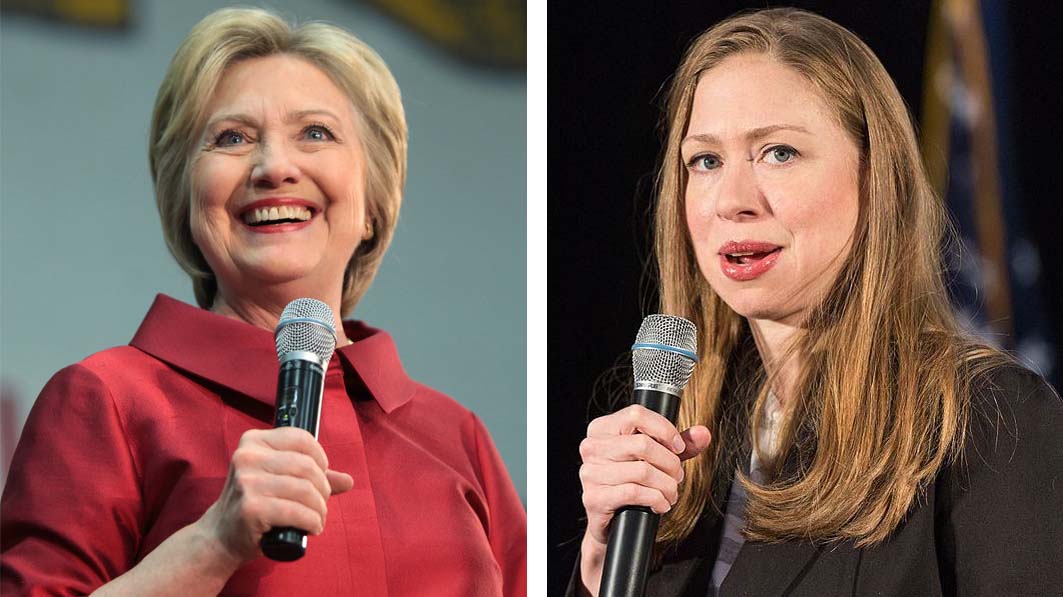It’s not every day that you happen upon an issue on which Hillary Clinton and social conservatives stand should-to-shoulder: both believe in the biological basis of being a woman.
Hillary and Chelsea Clinton’s recently published Book of Gutsy Women: Favorite Stories of Courage and Resilience includes a portrait of Danica Roem, Virginia’s first openly transgender state legislator.
This led a Sunday Times reporter to ask the Clinton duo if someone with a man’s biology “could ever be a woman.”
Without missing a beat, Chelsea replied, “Yes.”
The elder Clinton hesitated.
“I’m just learning about this. It’s a very big generational discussion, because this is not something I grew up with or ever saw,” she explained. “I think you’ve got to be sensitive to how difficult this is.”
The former secretary of state continued, “There are women who’d say [to a trans woman], ‘You know what, you’ve never had the kind of life experiences that I’ve had. So, I respect who you are, but don’t tell me you’re the same as me.’”
“I hear that conversation all the time.”
Later, in a BBC radio interview, the Clintons were again asked whether ‘transwomen are women.’
Mrs. Clinton affirmed her previous answer, noting “legitimate concerns” about claiming that anyone, regardless of biological gender, could be considered a woman.
While the former first lady acknowledged “the importance of recognizing self-identification,” she again affirmed that it is important to recognize “a legitimate concern about women’s lived experience.”
Mrs. Clinton cannot deny there is a categorical difference between biological women and those who merely feel that they are women.
How could she? Hillary Clinton, an icon of second-wave feminism, has dedicated her life to affirming the uniqueness of women’s experience.
This puts her at odds with left-wing activists. Leftists have rejected the core agenda of feminism. They have stripped the word woman of its meaning and cried “discrimination” when feminists advocate for the rights of biological women. They condemn feminists for being “anti-trans” and “trans-exclusionary.”
Feminists now, ironically, have common cause with conservatives. Both groups recognize the perilous implications when society defines gender apart from biology – implications that are currently unfolding. For example:
- In Iowa high schools, biological males who are transitioning are permitted to use women’s restrooms despite female students’ protests.
- In Connecticut, two biologically male students who identify as females crushed the competition in the women’s state track and field championships.
- A man dominated the women’s cycling world championships in 2019.
- Vulnerable women are forced to share quarters with biological men in homeless shelters.
When Secretary of Housing Ben Carson expressed concerns about allowing “big, hairy men” who claim to be women to have access to homeless shelters and safehouses for abused women he was called a bigot.
Trans-ideology trumps the safety of women.
The left, seeking to enfold the trans community within the coalition of oppressed groups it defends, has turned its back on women.
Libby Emmons, a left-leaning New York playwright, has been scorned as a bigot for her “trans-exclusionary” feminist views. The indie theater community ousted Emmons for rejecting transgender ideology.
“[The] left refuses to secure a woman’s identity from that of men and is willing to say that female is a feeling, identifiable by costume and demeanor,” Emmons writes. “That is what feminists have literally been fighting against the entire time.”
Today Emmons contributes to a number of conservative publications.
“After I made my views on the problems with trans ideology public, there was no place left for me on the left,” Emmons says. “[I] veered from theater into conservative publications, where I’ve found that there has been no conflict between my being a Democrat who maintains many leftist views and being able to write.”
Transgender politics has forged unlikely new alliances. Feminists who approach the transgender debate with common sense are finding common cause with the right.






